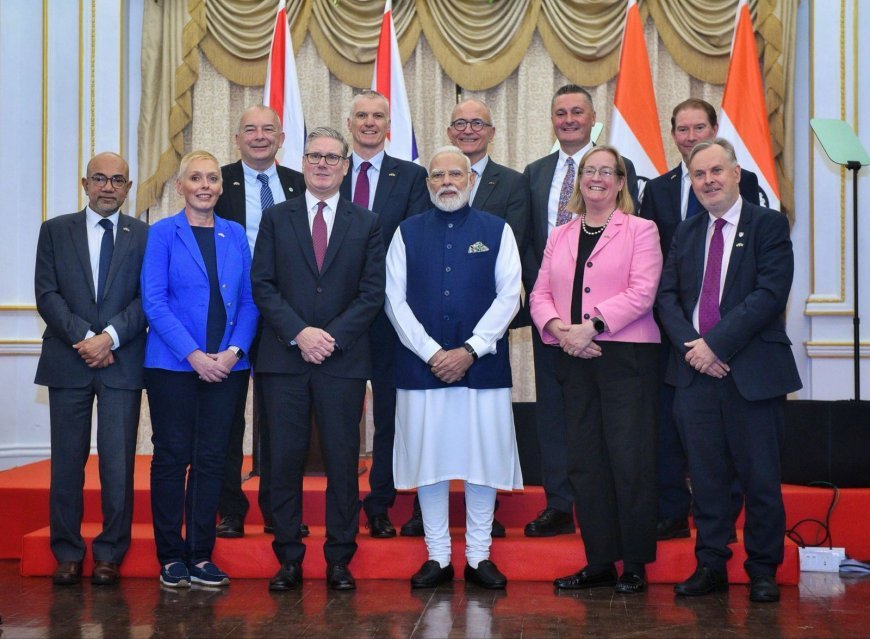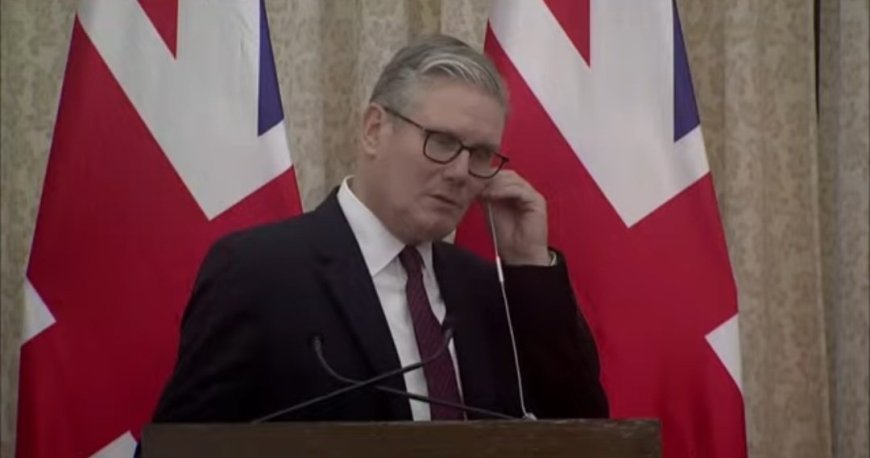UK PM’s Visit to India: A Strategic Turning Point in Bilateral Relations

The recent official visit of UK Prime Minister Keir Starmer to India (8–9 October 2025) marks a new chapter in the evolving partnership between the two nations. At the invitation of Prime Minister Narendra Modi, this is Starmer’s first formal trip to India as the UK’s leader.
While official visits always carry diplomatic weight, this particular journey arrives at a moment of renewed optimism — backed by a freshly signed trade pact, ambitions for technology collaboration, and global challenges calling for united action.
The Context Behind the Visit
Earlier in July 2025, India and the UK signed the India–UK Comprehensive Economic and Trade Agreement (CETA), which aims to significantly reduce tariffs, promote investment, and deepen economic ties. This trade deal had already laid the groundwork; Starmer’s visit serves as a political affirmation of that commitment.
Moreover, both countries have agreed on a “Vision 2035” roadmap, outlining priorities across trade, technology, defence, climate, health, and people-to-people ties. During the Mumbai trip, Starmer and Modi reinforced progress under the India-UK Comprehensive Strategic Partnership
In addition, the United Kingdom is expanding its educational presence — approving new campuses for British universities in India, which will connect talent and soft power.

Key Themes & Highlights of the Visit
1. Economic & Trade Boost
Trade was front and centre in the Starmer-Modi talks. The leaders and business delegations reaffirmed plans to implement CETA quickly, aiming to unlock new opportunities across sectors like clean energy, infrastructure, advanced manufacturing, and financial services. India reiterated its goal to attract investment across sectors such as technology, infrastructure, and clean energy, while the UK delegation explored bilateral prospects.
2. Technology & Innovation Cooperation
The Technology Security Initiative (TSI), launched earlier, got renewed momentum: Indian and UK leaders pledged joint ventures in AI, telecom, critical minerals, and secure networks. A new India–UK Connectivity & Innovation Centre is set to focus on 6G, non-terrestrial networks, and cybersecurity.
3. Defence and Strategic Collaboration
Defence ties received a boost, with discussions on maritime electric propulsion systems and closer training collaboration. Reports also indicate a substantial UK defence contract to supply India with lightweight missiles — solidifying this shift beyond diplomacy to real strategic commitment.
4. Education & Cultural Engagement
As noted, UK universities will expand on Indian soil, enhancing academic exchanges and soft diplomacy. This move signals an acknowledgement of India’s young demographic and thirst for global educational access.
5. Global & Diplomatic Significance
Starmer also voiced support for India’s aspiration for a permanent UN Security Council seat, reflecting the UK’s recognition of India’s rising global stature. Both leaders touched on shared responsibilities in climate change, maintaining a rules-based global order, and navigating conflicts like Ukraine.
Why This Visit Matters Deeply
-
Validation of mutual trust: The visit turns the trade agreement from a document into a political contract — showing both countries intend to walk the path together.
-
Future-oriented agenda: From AI and maritime tech to defence supplies, this visit helps shift the relationship beyond nostalgia and into tangible, future-facing collaboration.
-
Soft power & connectivity: Education, cultural exchange, and people-to-people links can cement goodwill for decades.
-
Global diplomacy alignment: As both democracies with significant clout, India and the UK strengthening ties sends a message about shared values and multipolar collaboration.
Conclusion
Prime Minister Keir Starmer’s India visit — his first as UK leader — is much more than a diplomatic gesture. It is a strategic reconfirmation of a deepening partnership, backed by trade, innovation, defence, and global ambition.
For India, it validates its rise on the world stage; for the UK, it reinforces a pivot to Asia after Brexit. Together, through Vision 2035 and CETA, both nations signal their intent not just to invest in each other, but to jointly navigate the complexities of a rapidly shifting global order.
What's Your Reaction?
 Like
0
Like
0
 Dislike
0
Dislike
0
 Love
0
Love
0
 Funny
0
Funny
0
 Angry
0
Angry
0
 Sad
0
Sad
0
 Wow
0
Wow
0




























